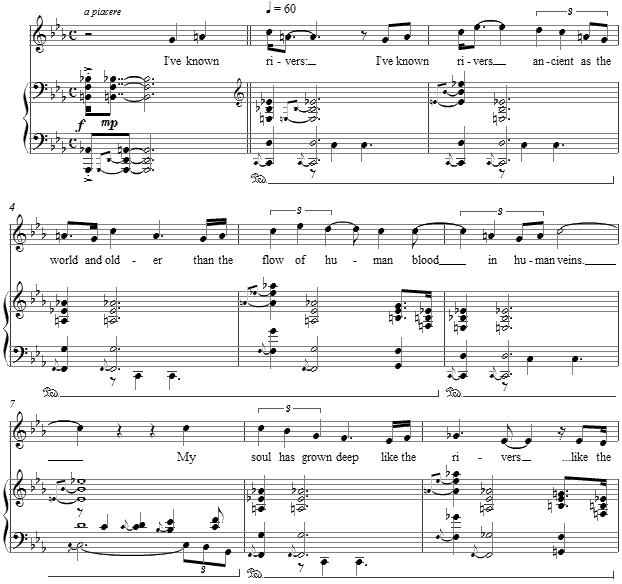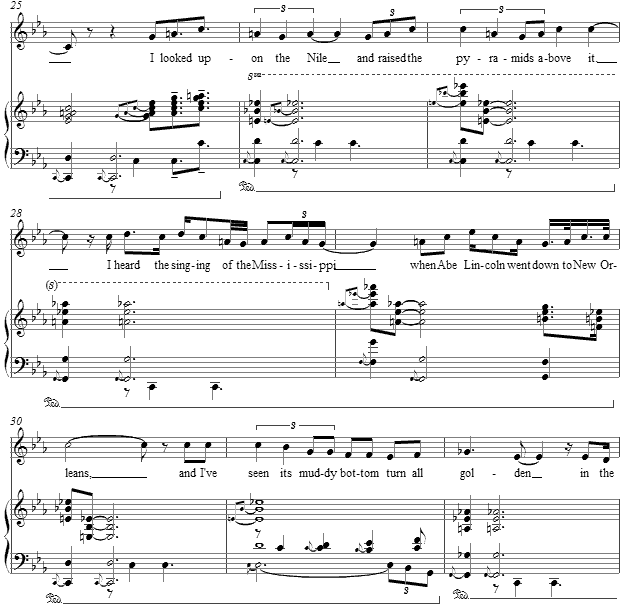Music and Texts of GARY BACHLUND
Vocal Music | Piano | Organ | Chamber Music | Orchestral | Articles and Commentary | Poems and Stories | Miscellany | FAQs
The Negro Speaks of Rivers - (2008)
for low or medium voice and piano
Langston Hughes
I've known rivers:
I've known rivers ancient as the world and older than the flow of human blood in human veins.
My soul has grown deep like the rivers.
I bathed in the Euphrates when dawns were young.
I built my hut near the Congo and it lulled me to sleep.
I looked upon the Nile and raised the pyramids above it.
I heard the singing of the Mississippi when Abe Lincoln went down to New Orleans, and I've seen its muddy bosom turn all golden in the sunset.
I've known rivers:
Ancient, dusky rivers.
My soul has grown deep like the rivers.
[ 4 pages, circa 3' 10" ]
Langston Hughes
First published in Crisis (June 1921): 71, this mythic retelling of a people's lineage is of course inexact [ 1 ], though most apt for its time. It was included in Hughes' collection, The Weary Blues (New York: A. A. Knopf, 1926). That fine poem which gives the collection its name has the phrases, "Droning a drowsy syncopated tune, / Rocking back and forth to a mellow croon, / I heard a Negro play." For this and the "few chords" which it suggests, this setting then became a simple ersatz blues, in which the back-and-forth between the tonic and subdominant minors trade places as an accompaniment.
Tessitura in the medium key
The major-minor character of a blues line suggest the basic chord form with both major and minor thirds and an included minor seventh, a favorite of many American composers. To this, the setting adds the second scale degree making the chord yet denser in tone and structure. The examples below are drawn from the medium key.
The free prose style of this poem demands a parlando style of setting, as the longer phrases fit themselves into the measured repetition of the chord successions.
The score for The Negro Speaks of Rivers is available as a free PDF download, though any major commercial performance or recording of the work is prohibited without prior arrangement with the composer. Click on the graphic below for this piano-vocal score.
Edition for medium voice and piano
Tessitura in the low key
Edition for low voice and piano
NOTES
[ 1 ] The Euphrates, a river flowing from Turkey through Iraq, unites with the Tigris and becomes the Shatt-al-Arab. The myth that the "fertile crescent" bore only the Negro race -- as Hughes speaks of it -- is of course inaccurate, for modern day Arabs are not synonymous with Africans, much less Americans of African descent. Additionally Israelites are biblically associated with the slavery of ancient Egypt, as much as are other national cultures. Additionally, there could logically be no race which would be "older than the flow of human blood in human veins." Indeed, I reject the still powerful notion that humans may be adequately described by the social construct, "race." Not only are there far too many mixtures between races at this point in human history, but the destructive effects of thinking along racial lines is now well known.
Even so, at the time of Hughes' writing, race had become a very "American" concept. Indeed, for Hughes, who edited important anthologies of black poetry with Arna Bontemps, The Poetry of the Negro 1746-1949 (1949), and Poems from Black Africa, Ethiopia, and Other Countries (1963), to be "Negro" was crucial to the advancement of equality, and the need for a large myth to assist in this was helpful to that end. That the word "negro" itself has become unfavored in light of the ultimately false cause of violence-laced, Leftist "black power" in America shows how groups aim words at issues, in the hopes of creating mythic power.
Hughes' soul, speaking as his title suggests for "the Negro," had "grown deep like the rivers." The same cannot be said equally of all who have labored in the fields of "Negro" art and culture.
For this I remain an admirer of James Weldon Johnson's 1922 The Book of American Negro Poetry, in which neither "negro" nor the modern word of flashpoint argument, "nigger," carry the political baggage with which today's politics has laden them.
Black poets represented in that impressive volume show no such faux sensitivity to the political correct use of words, but rather, like this text of Hughes, gather up words and images into most interesting and powerful messages worth preserving and revisiting.
As Weldon correctly asserted, "The status of the Negro in the United States' is more a question of national mental attitude toward the race than of actual conditions. And nothing will do more to change that mental attitude and raise his status than a demonstration of intellectual parity by the Negro through the production of literature and art."
The dream of decades later of the "color blind" society offered us by Martin Luther King has yet to become fully real based in part by the dead end alleys of "identity" politics which has done little to make of the "races" a more unified and truly tolerant human race.
See: Everything's about my colored skin - (or sadly, Why racism works)


